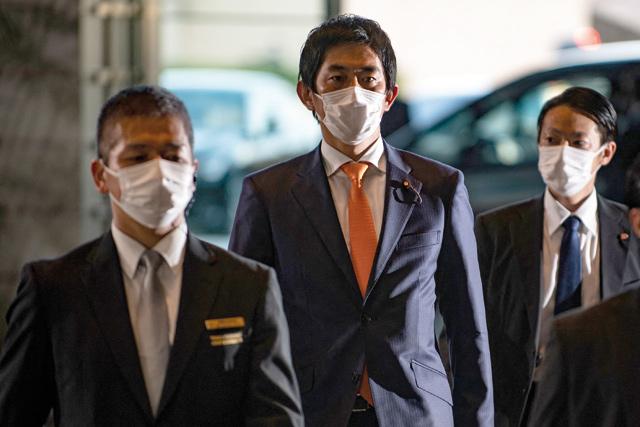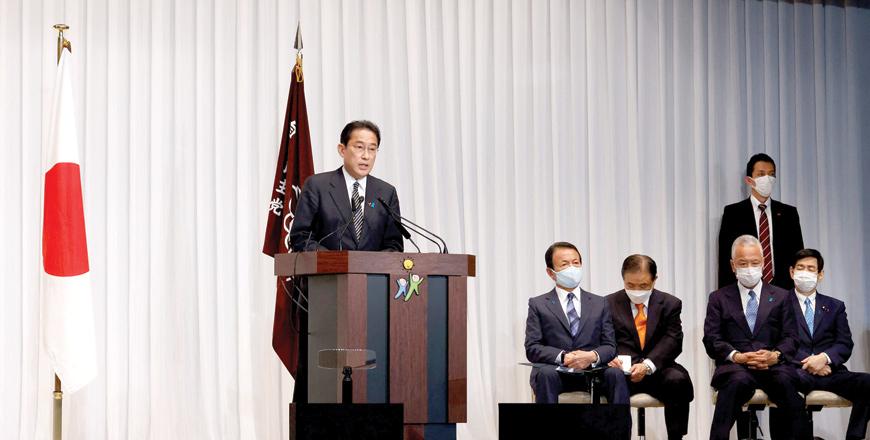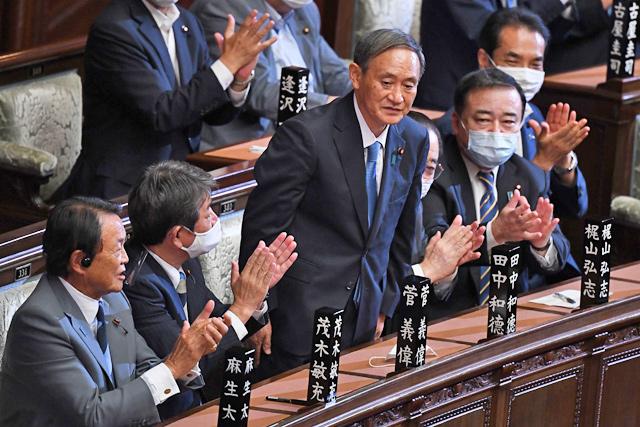You are here
Japan’s new PM Kishida says virus fight ‘top priority’
By AFP - Oct 04,2021 - Last updated at Oct 04,2021

Japan’s minister for economic security Takayuki Kobayashi (centre) arrives at the prime minister’s office in Tokyo, on Monday (AFP photo)
TOKYO — Japan’s new prime minister Fumio Kishida pledged to combat the pandemic with fresh stimulus and fight income inequality after lawmakers voted him leader of the world’s third-largest economy on Monday.
The soft-spoken 64-year-old from a Hiroshima political family made his first speech as premier hours after unveiling his Cabinet, a mix of holdovers and newcomers.
“I’m determined to fulfil my duty with all my strength and all my heart,” he said, calling measures to counter COVID-19 “top priority”.
“I will swiftly take economic measures to support those who have been considerably affected by the new coronavirus.”
He announced a general election on October 31, slightly earlier than expected, in which the ruling Liberal Democratic Party (LDP) and its coalition party are widely expected to retain power.
However, they could be vulnerable to losing some seats, with the public unhappy about the government’s virus response.
Having beaten popular vaccine chief Taro Kono last week to claim LDP leadership, Kishida easily won Monday’s vote in parliament to confirm him as prime minister thanks to the party’s commanding majority.
The new leader said he wanted to distribute the benefits of growth more evenly in society.
“I aim to create a new capitalism... in order for our country to open the way to the future,” he said.
He also pledged to further digitalise society, partly through investment in green tech and AI, adding that he intends to attend the upcoming G-20 and COP26 summits online.
New Cabinet
Kishida is widely considered a safe pair of hands, who commands support from his own faction within the LDP and is not expected to veer significantly from the government’s existing policies.
His election came after former prime minister Yoshihide Suga announced he would not stand for the LDP leadership after just one year in office.
Kishida’s new cabinet includes more than a dozen fresh faces but holdovers from the Suga government largely populate the most important positions.
Foreign Minister Toshimitsu Motegi, who has taken the lead in negotiating key trade deals, and Defence Minister Nobuo Kishi — brother of former Prime Minister Shinzo Abe — both retained their jobs.
The finance portfolio will go to Shunichi Suzuki, who is replacing his own brother-in-law Taro Aso.
The Cabinet includes three women, among them Kishida’s one-time rival for the leadership, Seiko Noda, who was named minister in charge of addressing Japan’s declining birthrate.
“The Kishida Cabinet aims at balance with consideration given to major factions, young lawmakers, and neighbouring countries,” said Junichi Makino, SMBC Nikko Securities chief economist.
“It’s the kind of cabinet formation that reflects Kishida, who works not to make enemies.”
Election looms
US President Joe Biden offered his congratulations to Kishida, saying the “historic partnership” between the two nations will continue.
As prime minister, Kishida faces a raft of challenges, from the post-pandemic economic recovery to confronting military threats from North Korea and from China, Japan’s biggest trading partner.
“We need to continue our dialogue [with China]. On the other hand, cooperating with our allies and friends, we are going to say firmly what we have to say. That’s an important stance,” he said.
And raising the emotional issue of Japanese people who Tokyo believes were abducted by North Korea, Kishida said he was willing to meet the reclusive country’s leader Kim Jong-un to discuss the issue “without conditions”.
Suga’s government saw its approval ratings slump as it struggled to tackle waves of infection, including a record virus spike over the summer while the Olympics were being held in Tokyo.
Much of Japan has been under virus emergency measures for a large part of the year, with the restrictions finally lifting last week as new infections decline.
More than 60 per cent of the population is now fully vaccinated, but there are concerns that the healthcare system could easily become overwhelmed again in a new virus wave.
Related Articles
TOKYO — Japan’s ruling party said Wednesday it will vote September 14 on a replacement for outgoing prime minister Shinzo Abe, who is steppi
TOKYO — Japan's Prime Minister Fumio Kishida declared victory on Monday after his ruling coalition won a strong majority in national electio
TOKYO — Yoshihide Suga became Japan's new prime minister on Wednesday, with the former chief Cabinet secretary expected to stick closely to

Opinion
Apr 07, 2025
Apr 07, 2025
Apr 07, 2025
Apr 06, 2025
- Popular
- Rated
- Commented
Apr 07, 2025
Apr 07, 2025
Apr 07, 2025
Newsletter
Get top stories and blog posts emailed to you each day.


















